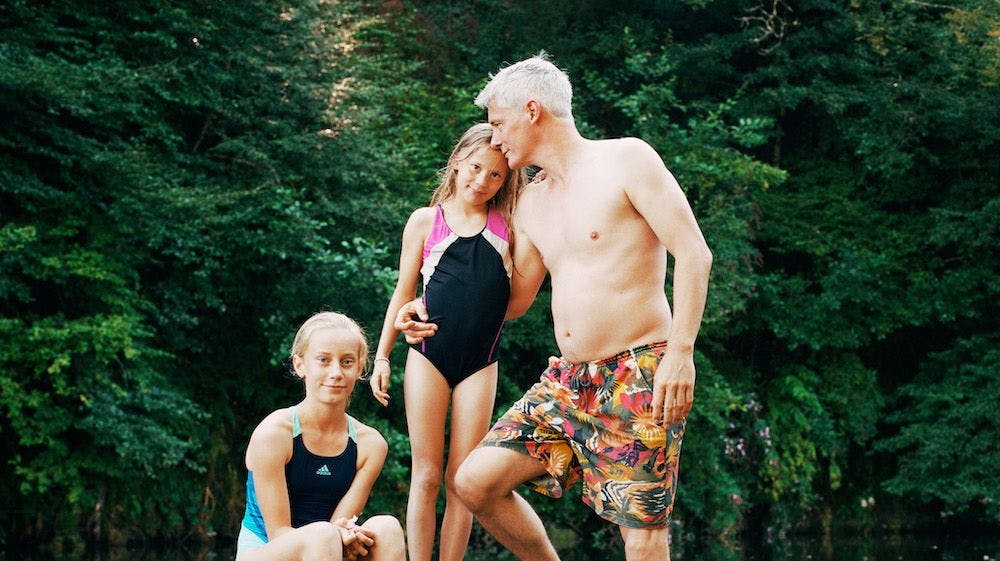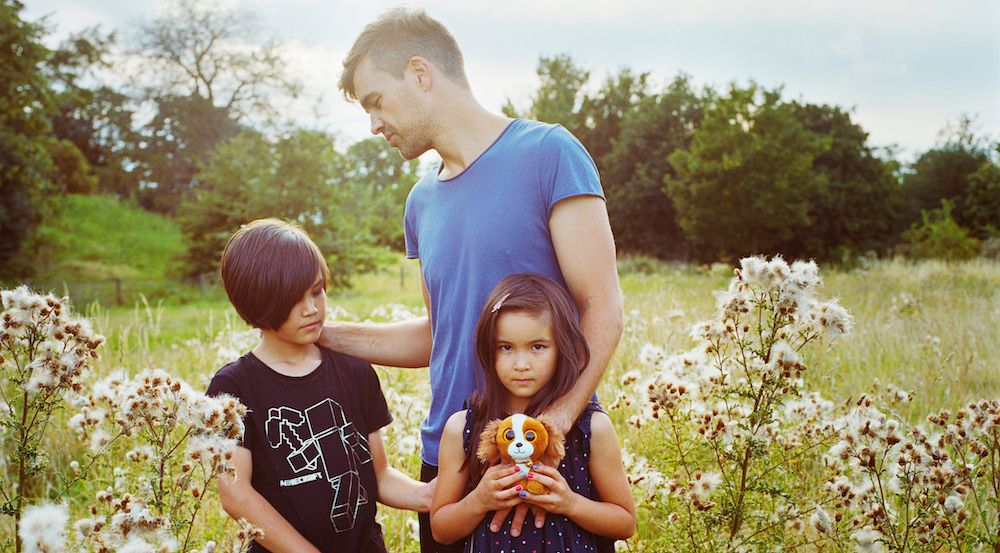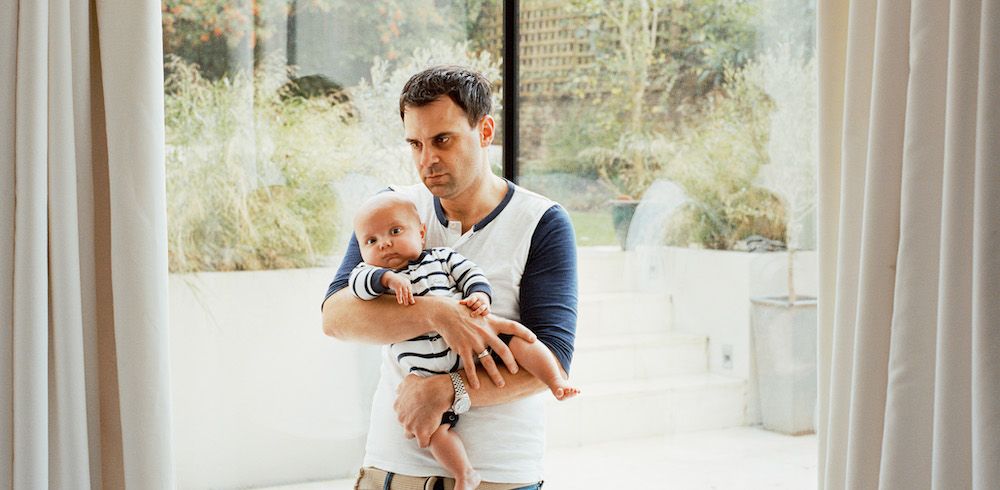
Testing, tender, and true – we speak to esteemed portrait photographer Harry Borden about his latest project, which explores the reality of single fatherhood
When I begin my call with Harry Borden, he tells me he’s just finished playing the piano – something he’s practised for two years, and immediately notes is a good way to stay ‘in the moment’. His mindful hobby slots alongside his work as a photographer, and Single Dad is his latest project – a series of portraits published in a beautifully bound book, each one showcasing a candid shot of a father and his children, accompanied by a quote that captures each man’s experience, ranging from the playful to the stoic, and occasionally the devastating.
And it’s a timely collection. According to the Office for National Statistics’ 2019 report, while lone-parent mothers remained the most common type of single parents, from 1999 to 2019, the number of single-parent fathers grew by 22%. Any proposed reasons for this increase are multi-faceted – but so too are the stories behind the numbers. In his introduction to the collection, Harry writes: “In a world where Homer Simpson is an archetypal father, they confound the simplistic notion of fathers as ridiculous.”
With 48 men featured, when I first flicked through the book I was tempted to call it a ‘celebration’ of single dads; but on reflection I realise that wasn’t quite right.
Yes, there are uplifting stories of men finding joy in parenting, but there is also a lot of pain – stemming from bereavement or a break down of a relationship, and from the unique challenges that dads face when they go it alone. Rather than a ‘celebration’, these portraits, and the snapshots of stories that they tell, are honest – they’re just true. When I float this thought with Harry, he points to one particularly striking example.
Neil is photographed with his son and daughter, Kiwa and Ngaire. Neil’s wife, Jeng, died in 2015, and, in his touchingly honest writing, Neil shares how he got through the first two years of single fatherhood on “adrenaline and bloody-mindedness”. The candid portrait of the trio is elevated by Neil’s final words: “I dreamt once that Jeng was a bird. I was alone on a ship with the kids, beating through the waves. We’ve had to let her go but she is flying above us.”

Neil Young and his children, Kiwa and Ngaire, by Harry Borden
“It’s quite an unusual situation where the dad is the main carer, and I’d say for probably half of my subjects that happened through losing their partner,” says Harry. “That’s not going to be a celebration. You can’t draw a veil over that, you have to confront it.
“Life is complicated. It’s neither a celebration, nor is it as harrowing and terrible as people portray it. We ebb and flow, don’t we?”
We do – and marking that spectrum is another poignant portrait of a man named Jonathan who, with the help of an egg donor and a surrogate, became a single dad by choice.
Jonathan’s son, Xavier, was born in Southern California in 2013. There are currently no statistics on the number of men becoming lone parents using surrogacy, with the law allowing single people to become parents via surrogacy only coming into effect in the UK in 2019. But Jonathan isn’t the only father in the collection to go down this route, and these snapshots of a new approach to fatherhood are only just beginning to be explored. But both new and traditional roles come with hurdles.
It’s difficult to separate any men’s issues from the disproportionate way that mental health can touch their lives – with the devastating statistics that 76% of suicides are male, and suicide being the biggest cause of death for men under 35. Additionally, a Canadian study published in The Lancet Public Health found that single fathers’ mortality risk was more than two times higher than other parents (partnered parents and single mothers) – highlighting lifestyle differences such as diet and alcohol consumption as potential causes.

Jonathan and his son Xavier, by Harry Borden
Whether or not this study translates to the UK, it’s true to say that single dads face additional challenges – social misconceptions, cultural and practical barriers (think changing facilities in public toilets), trials in the workplace, and isolation and loneliness. But, as is so often the case, talking helps.
“I’d say 80% of the people who wrote back to me said: ‘This has been really cathartic,’” Harry explains. “Where there had been a relationship breakdown, they’d had a dialogue with the mother, and it had given them an opportunity to reflect on their relationship. It was a really positive process, someone asking them to write about what they love about fatherhood, because we don’t stop to contemplate really.”
It’s no reach to say that the more we’re exposed to moments of tenderness and caregiving between fathers and their children, and the more we encourage and notice it in our own lives, the better our relationships will be – and that goes for the ones with ourselves as much as it does with the familial.
"Life is complicated. It’s neither a celebration nor as harrowing and terrible as people portray it. We ebb and flow"
“As men, we’re encouraged not to show any vulnerability – but I don’t think you lose your masculinity when you do,” Harry reflects. “A lot of the issues that men face stem from fear, and then that fear morphs into anger and defensiveness, but, really, if you can just admit that you’re afraid, then there’s a strength in that, and it’s such a relief to be able to just let that go and admit it.”
With a look to the future, it appears as though we are at a crossroads with our understanding of the role that gender has to play in our relationships – at the same time breaking barriers of what it means to be a man, while celebrating hyper-masculine characters in films and reality TV.
“I think we just need to redefine or reconfigure masculinity,” says Harry. “My philosophy with regards to men and women is that there are positive masculine traits, and there are positive feminine traits – and anyone can have either. We construct a society where we’re just people, and we look for the positives in the masculine and we reward those positives, but not slide into reinforcing that hyper-toxic masculinity. It’s important that we reflect on building something that will serve mankind in the future, in a way that is sustainable.”
The discussions around gender and masculinity are complex, and not something we’ll be able to crack overnight.
And yet, what Harry has captured with Single Dads is something simple: the power of devotion and determination, and the touching way that a tender sense of fatherly duty propels his subjects forward.
“The love a father can hold for their child is unexplainable, it runs deep into the very core of who you are,” writes one dad – Tayler, captured with his son Tristen. “It’s not easy being a single father; yet in the same breath, it’s not hard. I just love my son with all my heart.”
‘Single Dad’, photography by Harry Borden, foreword by Sir Bob Geldof (Hoxton Mini Press, £17.95 hardback) is out now.
Hero image | Tony with his daughters Louise and Emma, photography by Harry Borden
To connect with a counsellor for support, or to discuss parenthood, visit counselling-directory.org.uk

